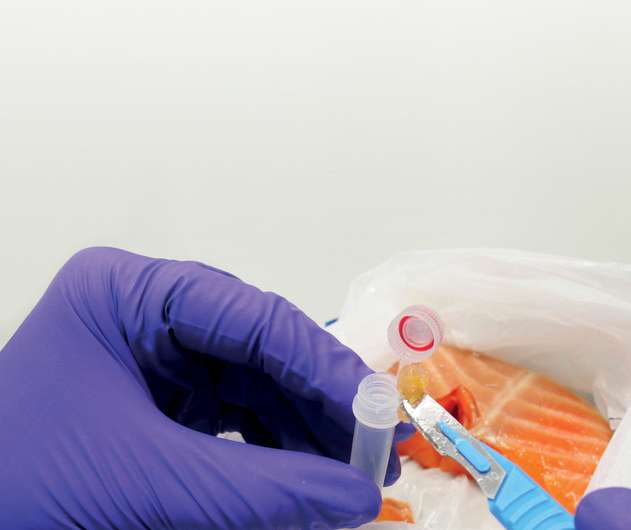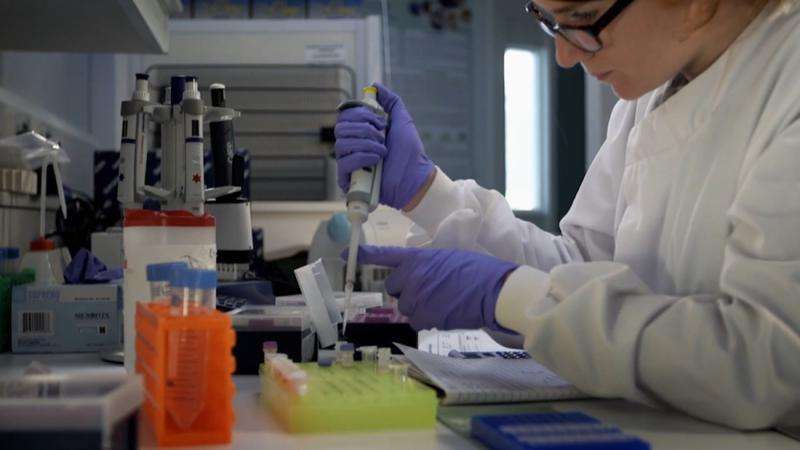DNA scalpel test fish traceability. Credit: SASA
Two-thirds (67 percent) of U.S. seafood consumers say they want to know that their fish can be traced back to a known and trusted source, with 58 percent saying they look to ecolabels as a trusted source of information. Globally, 55 percent doubt that the seafood they consume is what it says on the package. These findings are from the Marine Stewardship Council's (MSC) latest survey of more than 16,000 seafood consumers across 21 countries.
Today, the MSC also released results from DNA tests showing that over 99 percent of MSC ecolabeled products are correctly labeled. In 2015, the MSC commissioned the Wildlife DNA Forensics unit at Science and Advice for Scottish Agriculture (SASA) to conduct DNA tests on a random sample of 257 MSC ecolabeled seafood products from 16 countries. The test verifies that the species described on the packaging is the same as that in the product. By comparison, Oceana's nationwide survey in 2013 found one-third (33 percent) of U.S. seafood samples genetically analyzed were mislabeled.
Commenting on the results, Brian Perkins, MSC Regional Director—Americas, said, "The MSC's DNA results prove you can trust that seafood sold with the blue MSC ecolabel really is what the package says it is and can be traced from ocean to plate. Last month, the U.S. government announced proposed rules that would require tracking to combat illegal fishing and fraud. Many businesses are left wondering whether they're selling seafood that was produced legally and sustainably. MSC certification means consumers and businesses can be confident that MSC ecolabeled fish has been caught legally and can be traced back to a sustainable source."
DNA screengrab from mission Save the Oceans video. Credit: United Postcode Lotteries
The latest round of DNA testing is the fifth to be commissioned by the MSC. Previous results also showed very little mislabeling of MSC ecolabeled seafood. The MSC's DNA testing program and results are captured in a new report, Ocean to plate: How DNA testing helps to ensure traceable sustainable seafood.
MSC ecolabeled fish is sold and processed by certified organizations operating in more than 38,000 sites in over 100 countries. Fishers, processors, retailers and chefs handling MSC certified seafood must follow strict requirements to ensure that seafood is traceable and correctly labeled. The MSC Chain of Custody Standard is used by leading brands in driving awareness and consumer education on sustainable seafood such as Whole Foods, McDonald's, and IKEA to ensure the integrity of the products they sell.
All MSC certified seafood comes from fisheries which have been independently certified to the MSC's standard for sustainable fishing, widely recognized as the world's most credible and robust seafood sustainability certification.
There are now more than 20,000 MSC ecolabeled products available in 100 countries. To accompany the test findings, the MSC has released a new animation for consumers showing the journey of MSC certified seafood from ocean to plate.
At the center of the MSC's Ocean to Plate campaign sits an awesome animation. It's a beautifully simple 50 second story that shows the journey of a fish from plate to ocean and back again. Credit: Marine Stewardship Council
Provided by Marine Stewardship Council























